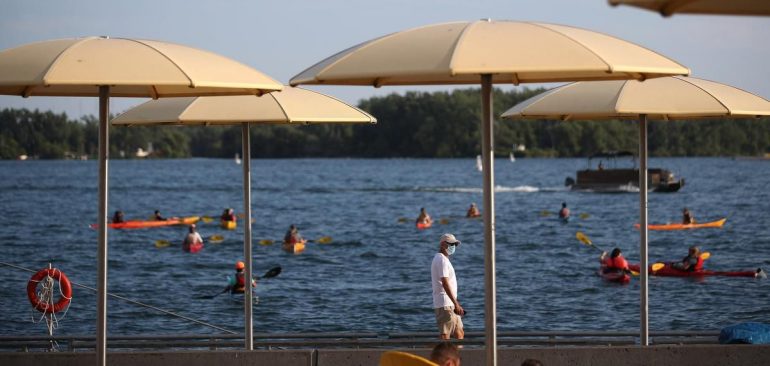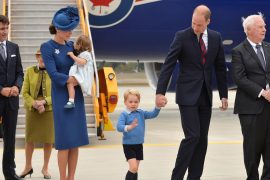The latest coronavirus news from Canada and around the world Wednesday. This file will be updated throughout the day. Web links to longer stories if available.
9:05 a.m. At least one visitor to Toronto’s Brass Rail strip club has contracted COVID-19, say health officials who last week warned the public that an ill staff member had potentially exposed 550 people to the virus.
“To date, one person who was contacted by (Toronto Public Health) from the establishment’s contact tracing log who had attended the establishment, had symptoms and has tested positive for COVID-19,” Dr. Vinita Dubey, a senior TPH official, said in a statement Tuesday to the Star.
“This person lives outside of Toronto and TPH is working with the applicable health unit who will request information about possible sources of infection as part of their investigation.”
Read the full story by the Star’s David Rider
8:55 a.m. Hawaii Gov. David Ige has hinted about it for weeks as COVID-19 cases in the state surged, and on Tuesday he made it official: The state won’t reopen to tourism until October at the earliest.
The planned Sept. 1 start of a program that would allow out-of-state visitors to bypass Hawaii’s strict 14-day quarantine upon arrival by presenting a negative COVID-19 test at the airport has been delayed until at least Oct. 1, Ige said late Tuesday.
“We will continue to monitor the conditions here in Hawaii as well as key markets on the mainland to determine the appropriate start date for the pre-travel (COVID-19) testing program,” he said.
8:40 a.m. (updated) Statistics Canada says the consumer price index was up 0.1 per cent compared with a year ago as gasoline prices were down nearly 15 per cent.
The annual inflation rate compared with a reading of 0.7 per cent in June.
The average economist estimate had been for a year-over-year increase of 0.5 per cent for July, according to financial data firm Refinitiv.
7:26 a.m. FIFA forecast the pandemic will cause a $120 million (U.S.) drop in its revenue plan through the 2022 World Cup in a revised four-year budget published Wednesday.
Cost-cutting is also predicted to help offset a $200 million (U.S.) hit from being unable to stage a revamped Club World Cup in June 2021, when Europe and South America stage their postponed continental championships.
Still, FIFA said most World Cup broadcast and sponsor deals were already signed and should keep the same profit in the 2019-22 financial cycle, even on reduced income of $6.44 billion (U.S.)
7:25 a.m. U.K. Health Secretary Matt Hancock said the government is “working on” introducing tests for COVID-19 at airports, a move that would ease the requirement on travelers to self-isolate on arrival.
“This is one of the examples of why mass testing can help,” Hancock told BBC Radio on Wednesday. “If you can have a test technology where the test result comes back in a matter of minutes rather than the next day because you don’t have to send it to the lab, then you can check that people don’t have and aren’t transmitting the virus now.”
With many British schools on their summer vacations, the requirement for holidaymakers to isolate for two weeks on returning from abroad is one of the most prominent examples of the tension between the government’s desire to get life back to normal and its fear that infection levels will start to rise. Last week, the U.K. said people returning from France must self-isolate.
7 a.m. Statistics Canada will say Wednesday what the country’s inflation barometer read in July.
The consumer price index was up 0.7 per cent in June compared with a year earlier, following two months of negative readings.
The turnaround from May to June matched the fastest acceleration in the so-called headline inflation reading since March 2011, but still left the measure well below the Bank of Canada’s two per cent target.
The jump to July isn’t expected to be as sharp.
Financial data firm Refinitiv says the average economist estimate is for a year-over-year increase of 0.5 per cent.
The Bank of Canada forecast last month that annual inflation will be 0.6 per cent this year and vowed to maintain its key interest rate at the lower limit of 0.25 per cent until inflation hits the central bank’s two per cent target.
6:31 a.m.: Thousands of downtown workers won’t be cramming into Toronto’s subways and office tower elevators any time soon as the city continues to grapple with COVID-19.
A number of large firms and banks have asked employees to continue to work from home until at least the end of the year, leaving Toronto’s financial district a virtual ghost town heading into fall.
“Office towers are all those things that we don’t want with respect to COVID-19: bringing lots of people together in small spaces breathing recycled air,” said infection control epidemiologist Colin Furness. “It’s basically a high-density working environment, and from a public health standpoint and pandemic standpoint, really unsafe.”
Some of the country’s largest banks were among the first major companies with large downtown Toronto offices to announce that most of their employees won’t be returning to their desks until at least 2021.
Read the full story from the Star’s Jacques Gallant here.
6:30 a.m.: As Ontario’s eviction moratorium has lifted, new research shows that the Toronto neighbourhoods where tenants have faced the highest eviction filing rates in recent years mirror those where COVID-19 has hit hardest.
The findings, shared exclusively with the Star, suggest that if a wave of evictions follows the pandemic — as tenant advocates fear — residents of the same neighbourhoods will bear the brunt of a secondary crisis.
It’s a parallel that Scott Leon, who co-authored Wednesday’s study for the Wellesley Institute, called “troubling.”
Read the exclusive story from the Star’s Victoria Gibson here.
6:28 a.m.: Millions of women and girls globally have lost access to contraceptives and abortion services because of the coronavirus pandemic. Now the first widespread measure of the toll says India with its abrupt, months-long lockdown has been hit especially hard.
Several months into the pandemic, many women now have second-trimester pregnancies because they could not find care in time.
Across 37 countries, nearly 2 million fewer women received services between January and June than in the same period last year, Marie Stopes International says in a new report — 1.3 million in India alone. The organization expects 900,000 unintended pregnancies worldwide as a result, along with 1.5 million unsafe abortions and more than 3,000 maternal deaths.
Those numbers “will likely be greatly amplified” if services falter elsewhere in Latin America, Africa and Asia, Marie Stopes’ director of global evidence, Kathryn Church, has said.
6:27 a.m.: India reported 1,092 new fatalities from COVID-19 on Wednesday, its highest single-day total. The country has the fourth-most deaths in the world and the third-most cases, with over 2.7 million — including more than 64,000 new infections reported Wednesday.
The actual numbers, like elsewhere in the world, are thought to be far higher due to limited testing. Four of India’s 28 states now account for 63 per cent of total fatalities and 54.6 per cent of the caseload. The western state of Maharashtra and the southern states of Tamil Nadu, Andhra Pradesh and Karnataka are the country’s worst-hit regions.
6:26 a.m.: South Korean health workers have found more than 600 coronavirus infections linked to a Seoul church led by a vocal opponent of the country’s president as officials began restricting gatherings in the greater capital area amid fears that transmissions are getting out of control.
Vice Health Minister Kim Gang-lip said Wednesday that health authorities are also seeking location data provided by cellphone carriers while trying to track thousands who participated in an anti-government protest on Saturday, which worsened the virus’s spread. The march was attended by members of the Sarang Jeil Church and its ultra-right pastor, Jun Kwang-hun, who has been hospitalized since Monday after testing positive.
Loading…
Loading…Loading…Loading…Loading…Loading…
Kwon Jun-wook, director of South Korea’s National Health Institute, said 623 cases have been linked to church members after the completion of some 3,000 tests. Police are pursuing around 600 church members who remain out of contact.
6:26 a.m.: Finland says it will tighten travel restrictions and reintroduce and step up border checks for arrivals from 10 countries starting Monday due to the worsening pandemic situation in Europe and elsewhere.
The Finnish government says border checks will apply for passengers to and from Nordic neighbours Denmark, Iceland and Norway as well as Germany, Greece and Malta — all countries belonging to the European Union’s borderless Schengen area.
Outside the Schengen area, border checks will be stepped up for arrivals from Cyprus, Ireland, San Marino and Japan.
6:45 a.m.: Iran surpassed 20,000 confirmed deaths from the coronavirus on Wednesday, the health ministry said — the highest death toll for any Middle East country so far in the pandemic.
The announcement came as the Islamic Republic, which has been struggling with both the region’s largest outbreak and the highest number of fatalities, went ahead with university entrance exams for over 1 million students. Iran is also preparing for mass Shiite commemorations later this month.
Iran suffered the region’s first major outbreak, seeing top politicians, health officials and religious leaders in its Shiite theocracy stricken with the virus. It has since struggled to contain the spread of the virus across this nation of 80 million people, initially beating it back only to see it spike again beginning in June.
6:23 a.m.: A coalition of Ontario educators says substitute teachers are concerned about health and safety risks related to working in multiple schools as they prepare to return to classrooms in the midst of the COVID-19 pandemic.
Ontario Education Workers United, an organization made up of high school teachers, is the latest to sound the alarm over the Ontario government’s back-to-school plan, which has also drawn criticism from teachers’ unions as well as some parents and students.
The plan, announced weeks before the school year is set to begin, allows elementary students and many high school students to be in class five days a week in standard class sizes.
Occasional workers have been left out of the conversation on how to safely reopen schools, the coalition said.
“We have been hearing a lot from occasional workers that they are very worried and feel unseen in this whole process,” said James Campbell, one of the group’s organizers.
“They are often the most precarious of all educational workers because they are often earlier in their career and don’t always have permanent contracts.”
Wednesday 1:48 a.m. Japan’s exports in July plunged 19.2 per cent from a year ago, as the coronavirus pandemic continues to slam the world’s third largest economy.
The Finance Ministry’s provisional numbers showed Japan’s imports in July fell 22.3 per cent.
Exports to the U.S. especially suffered, declining 19.5 per cent last month. They include plastic goods, iron and steel and computer parts. But Japan recorded its first trade surplus in four months on the back of a recovery in China.
Japan’s export-reliant economy has been ailing since the outbreak caused some plant production to be temporarily halted, squelched tourism and generally hurt economic activity.
Japan has never imposed a lockdown but has encouraged people to work from home, wear masks and social distance. Some stores have closed or shortened their hours.
Tuesday 6 p.m.: As of 5 p.m. Tuesday, Ontario’s regional health units are reporting a total of 42,941 confirmed or probable cases of COVID-19, including 2,828 deaths, up another 115 cases in 24 hours, according to the Star’s latest count.
It was the first day since Aug. 1 that the province had reported a second day in a row with a jump into the triple digits.
Four health units reported 10 or more cases Tuesday: Windsor-Essex, with 25 cases, Toronto, with 22, Peel Region, with 15, and Huron-Perth, with 13.
In the last week, Huron-Perth, the smallest health unit in southern Ontario by population, has seen infections jump to the highest rate the region has seen since the beginning of the pandemic. (Even adjusting for population, the unit’s case average is still well below the worst levels seen in larger cities in April and May.)
The long-term average for daily case reports has been consistently below triple digits since the province saw a brief spike late last month, and the province remains near the lowest rate of new infections since before the pandemic first peaked in Ontario in the spring.
That rate rose Tuesday to an average of 91 cases per day over the last week. At the pandemic’s worst, Ontario saw the same average reach a mid-April peak of nearly 600 daily.
A single new fatal case was reported Tuesday, in Ottawa; Ontario has averaged less than a single reported death per day over the last seven days.
The vast majority of the province’s COVID-19 patients have since recovered; the province lists fewer than 1,000 active cases of the disease.
The Star’s count includes some patients reported as “probable” COVID-19 cases, meaning they have symptoms and contacts or travel history that indicate they very likely have the disease, but have not yet received a positive lab test.
The province cautions its separate data, published daily at 10:30 a.m., may be incomplete or out of date due to delays in the reporting system, saying that in the event of a discrepancy, “data reported by (the health units) should be considered the most up to date.”

Devoted web advocate. Bacon scholar. Internet lover. Passionate twitteraholic. Unable to type with boxing gloves on. Lifelong beer fanatic.





